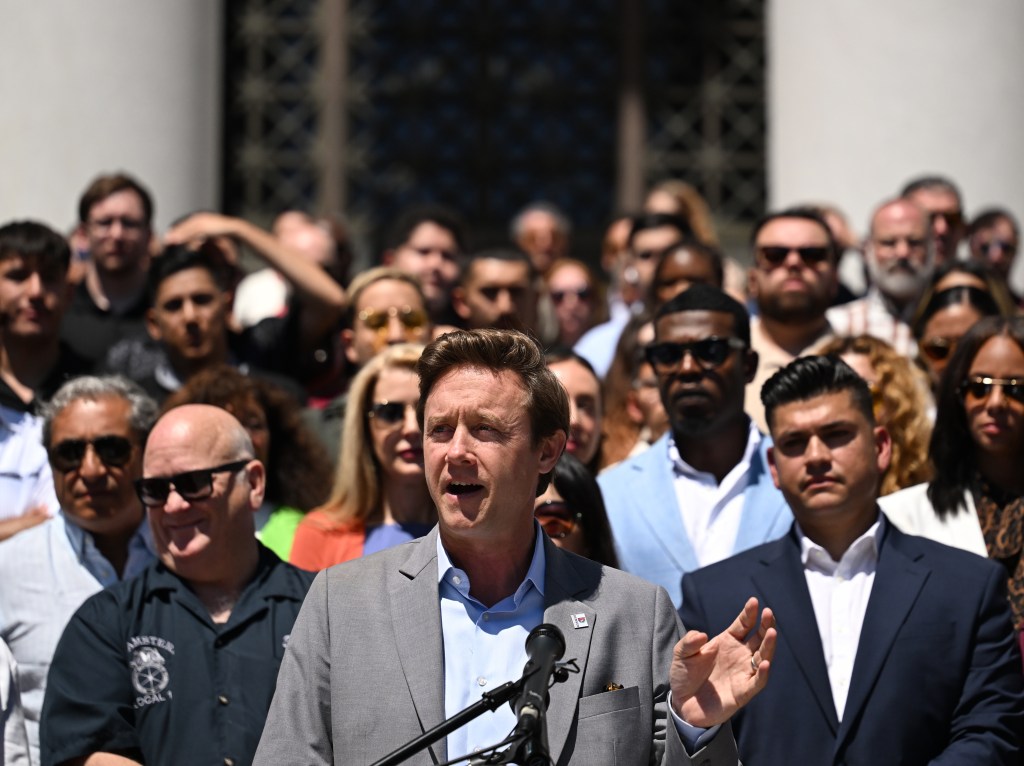Voters will have their say on the largest dedicated sales tax in Denver’s history in November after the City Council on Monday referred a 0.5% tax hike aimed at greatly increasing the amount of affordable housing in the city to the ballot.
The 13-member council voted 9-4 to send the tax to voters. Now it is up to the residents of a city that has quickly become one of the least affordable housing markets in America to decide whether or not to add that half-percent on top of the city’s existing 8.81% effective sales tax rate.
“Now is the time to act,” Councilman Darrell Watson said before voting with the majority.
Exactly how the estimated $100 million in new annual tax revenue the measure is expected to generate — should voters pass it — will be invested each year is yet to be determined.
Mayor Mike Johnston and supporters on the council have talked about investing in programs like rental assistance to keep people stabilized housed and downpayment assistance to help lower-income Denverites buy into the market and build wealth. The mayor has even floated the idea that the city could become an equity investor in new developments that would allow city leaders to have a direct say in the number of affordable apartments in new building and the prices at which rents should be set to keep make them affordable to people on the lower end of the income spectrum.
Among a flurry of last-minute amendments that the council adopted on Monday night was a change that clarified the council’s role in reviewing and approving the first-year spending plan for the fund in January and cementing the council’s authority to approve prioritization plans for funding in future years.
Even some council members who were uneasy with that lack of clarity said they see the deep housing needs in their districts and are ready to let voters decide.
“I will support it going to the voters but we have to be honest; good intentions exist but the clarity and specificity doesn’t,” Councilwoman Jamie Torres said before casting her yes vote.
Torres was the only member who changed her vote after the council held a public hearing and preliminary vote last week. The ballot referral measure passed 8-5 on that first reading with Torres among the dissenting minority.
She was among the members who wanted assurances that the tax revenue would be used to support Denverites who research shows have the greatest amount of need for more housing in their price ranges, those making 80% of the area median income or below. The area median income — or AMI — for Denver in 2024 is $130,400 for a family of four or $91,280 for an individual, according to a chart prepared by the city’s housing department.
Concerns about area median income limits were also addressed via an amendment on Monday. The change mandated the city use dollars generated by the tax only to support projects and programs that serve renters making 80% of the AMI or below. Select mixed-income developments could still qualify for support from the fund if the average cost of units in that development is available to renters making 100% of AMI or below.
The third major change council members approved on Monday was the installation of a sunset — or expiration date — for the tax. Without council or voter intervention, the sales tax — dubbed by the supporters the Affordable Denver fund — would end on Dec. 31, 2064, 40 years from now.
Even with that distant sunset date included, four council members declined to support sending the measure to voters. Kevin Flynn, Flor Alvidrez, Stacie Gilmore and Amanda Sawyer all voted no.
Gilmore in particular blasted the process by which the tax measure made it before the council, saying it lacked sufficient public input. She worried raising taxes could further cost-burden low-income Black and Latino families in her far northeast district.
Flynn has opposed the tax increase since before it was even officially unveiled by the mayor at a press conference on July 8, just seven weeks ago.
“I think we have to stop talking about making Denver affordable by raising the cost of living here,” he said.
The Affordable Denver tax will appear on the ballot alongside a 0.34% sales tax increase that the council already approved sending to the ballot to raise money to shore up the finances for Denver Health, the city’s struggling social safety net hospital. If both taxes pass, it would push Denver’s cumulative sales tax rate to 9.65%, among the highest in the state outside select mountain communities.
But even council members worried about those two measures competing with one another — like Councilman Chris Hinds, who received life-saving care at Denver Health — acknowledged that having stable housing is a social determinant of public health.
Johnston was still at City Hall following Monday’s vote. He credited the five council sponsors of the referral measure — including council President Amanda Sandoval, who visited him in his office at the vote — for their work in passing amendments that helped get the referral over the finish line.
The mayor knows the message he will be delivering to voters before they have their say on Nov. 5.
“We’ll need to talk to voters about what this fund will do, how we’ll help bring on 45,000 units (of affordable housing), how we’ll serve people at all levels of need across the city, and how it puts Denver on a path to be a city that both can be the fastest-growing economic engine in the country and a place where a second-grade teacher can still afford to live in the neighborhood where she teaches,” he said. “I think we’re on a path to do that.”
Stay up-to-date with Colorado Politics by signing up for our weekly newsletter, The Spot.
Originally Published:


